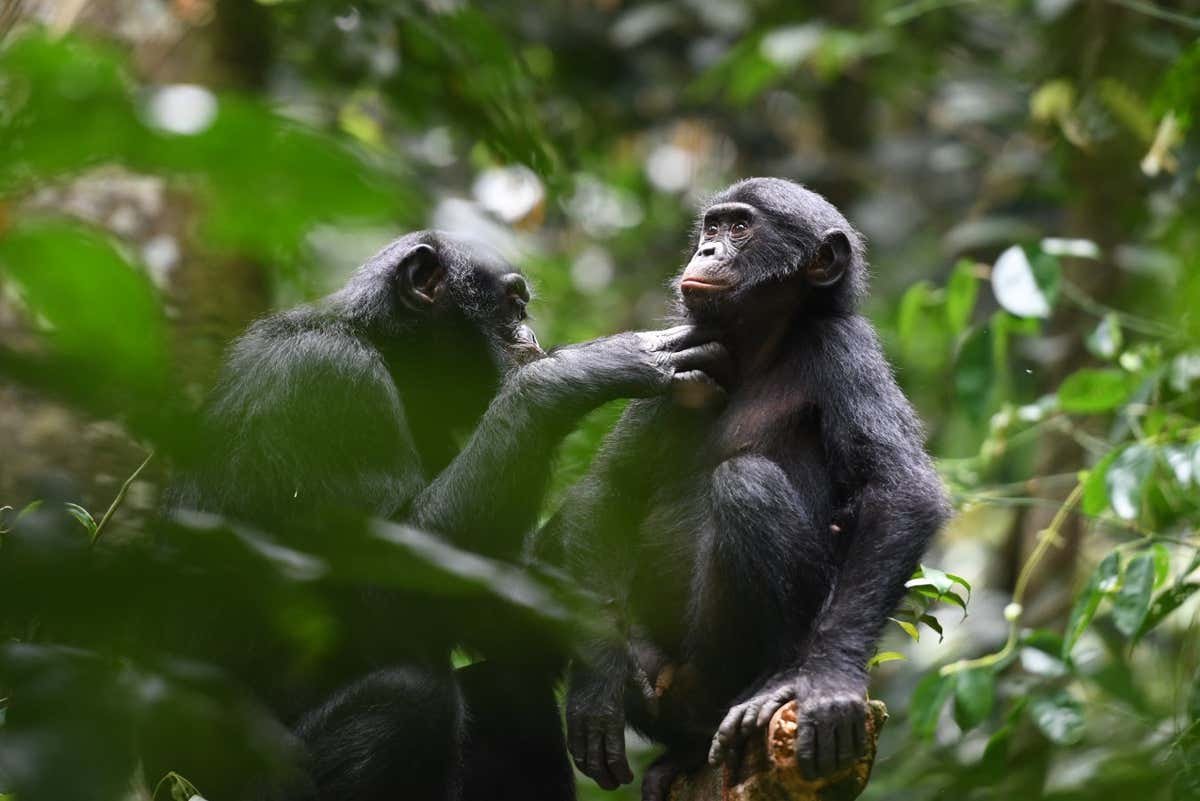
Bonobos frequently have cordial interactions with members of other social groups
Martin Surbeck/Harvard University
Bonobos often form friendly alliances with other bonobos in separate social groups, in line with some humans – but in stark contrast to chimpanzees.
Whereas chimpanzees are often so hostile to other groups of chimpanzees that they end up killing each other, bonobos willingly groom and share food with members of other groups. The findings challenge the idea that humans evolved from ancestral apes that were innately violent, says Martin Surbeck at Harvard University.
“This potential to form collaborative links between different groups is not uniquely human and it might have occurred earlier than we thought,” he says. “There’s a potentially larger behavioral variation in our evolutionary past than we’ve appreciated so far.”
Many animals – including various mammals, birds and insects – cooperate with each other, but they appear to only do so with those within their close social circle, or in-group. Hostile interactions between groups are common among animals, including chimpanzees (Pan troglodytes). Since chimpanzees are humans’ most studied closest living relative, scientists have often assumed that violence and hostility towards other social groups in humans is innate, says Liran Samuni, also at Harvard.
However, humans also cooperate extensively with people in different social circles – for example, by trading, sharing and teaching others what they know – without necessarily getting any immediate benefits from that cooperation.
Bonobos (Pan paniscus) are humans’ other closest living relative. While bonobos have been significantly less studied than chimpanzees, researchers know that they tend to be more peaceful — at least in that they don’t kill or sexually coerce each other, says Surbeck.
To learn more about interactions between groups, Surbeck and Samuni observed 31 adult bonobos from two separate social groups in the Democratic Republic of the Congo over a two-year period. The pair documented 95 encounters between the two groups, lasting from less than an hour to more than 14 days, which represented about 20 per cent of their total observation time.
As expected, the bonobos groomed, shared food and formed alliances with in-group members. But unlike chimpanzees observed in previous studies, they also showed cooperation with out-group members. In fact, 10 per cent of all mutual grooming and 6 per cent of all food sharing occurred among members of different social groups.
While bonobos that groomed others usually got an immediate benefit from the recipient returning the favour, food sharing rarely resulted in a gift in return. Only 14 per cent of bonobos that received food were seen to respond in kind. This suggests that their actions were “not solely motivated by selfish interests or immediate rewards”, Surbeck and Samuni report.
Kasper Otten at the Research and Documentation Centre in the Netherlands finds the study “exciting”, especially as it “challenges the idea of human exceptionalism” with regard to cooperation outside one’s group.
Otten says the bonobos that were most cooperative and least aggressive within their groups were the same ones who cooperated more with out-group members, which resonates with findings from humans. “Scholars used to believe that in-group ‘love’ goes together with out-group ‘hate’, but recent research suggests that often in-group cooperators are also out-group cooperators,” he says.
The reason chimpanzees and bonobos differ so much in their levels of hostility and cooperation is still uncertain. It might be related to chimpanzees having social structures based on male dominance, whereas in bonobos, females have more status, says Samuni. “There are all these theories in human evolution about the warrior male hypothesis and differences between the sexes, and how we approach things, and how competition plays out differently within the sexes,” she says.
Topics:

Felecia Phillips Ollie DD (h.c.) is the inspiring leader and founder of The Equality Network LLC (TEN). With a background in coaching, travel, and a career in news, Felecia brings a unique perspective to promoting diversity and inclusion. Holding a Bachelor’s Degree in English/Communications, she is passionate about creating a more inclusive future. From graduating from Mississippi Valley State University to leading initiatives like the Washington State Department of Ecology’s Equal Employment Opportunity Program, Felecia is dedicated to making a positive impact. Join her journey on our blog as she shares insights and leads the charge for equity through The Equality Network.




